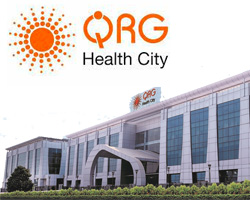Mastoidectomy
A mastoidectomy is a surgical procedure performed to remove part or all of the mastoid bone, which is located behind the ear. This procedure is commonly done to treat various ear conditions, including chronic ear infections, cholesteatoma (a noncancerous skin growth in the middle ear), and other ear-related issues that can lead to hearing loss or recurring infections.

Who Needs Mastoidectomy
Mastoidectomy may be recommended for individuals who:
Have Chronic Ear Infections: Recurrent ear infections that do not respond to conservative treatments like antibiotics.
Are Diagnosed with Cholesteatoma: A noncancerous but potentially damaging growth in the middle ear.
Suffer from Hearing Loss: When hearing loss is attributed to chronic ear infections or middle ear issues.
Experience Persistent Ear Drainage: Chronic drainage from the ear due to infections or other issues.
When to See a Specialist
If you or your child experience chronic ear infections, hearing loss, persistent ear drainage, or have been diagnosed with cholesteatoma, consult with an otolaryngologist (ear, nose, and throat specialist). They will evaluate your condition and determine if a mastoidectomy is necessary.
Procedure
Pre-Operative Assessment: Your surgeon will conduct a thorough evaluation, which may include imaging like CT scans or MRI, to assess the extent of the ear condition.
Anesthesia: Mastoidectomy is typically performed under general anesthesia, ensuring you are completely asleep during the procedure.
Incision: The surgeon makes an incision behind or around the ear to access the mastoid bone and middle ear.
Mastoid Bone Removal: The mastoid bone is carefully drilled away to access and address the ear condition, such as removing infections or cholesteatoma.
Reconstruction: In some cases, reconstructive procedures may be performed to rebuild damaged middle ear structures or to restore hearing.
Closure: The incisions are closed with sutures or staples, and a sterile dressing is applied.
Road To Recovery
Hospital Stay: Most mastoidectomy procedures are performed as inpatient surgeries, and you may need to stay in the hospital for a short period.
Pain Management: Post-operative pain can be managed with prescribed pain medications.
Recovery Time: It can take several weeks to months for complete recovery, depending on the complexity of the procedure.
Risk Management
Infection: Infection at the surgical site is a risk, so post-operative wound care and antibiotics are typically prescribed.
Hearing Changes: While the procedure aims to improve hearing, there can be temporary or permanent changes in hearing.
Benefits of Mastoidectomy
Resolution of Chronic Infections: For individuals with chronic ear infections, mastoidectomy can provide lasting relief.
Restoration of Hearing: When hearing loss is related to ear conditions, this procedure can improve or restore hearing.
Frequently Asked Questions about Mastoidectomy
Is mastoidectomy a painful procedure?
Post-operative pain is common but manageable with pain medications.
How long does it take to recover from mastoidectomy?
Complete recovery can take several weeks to months, depending on the complexity of the procedure.
Will I regain my hearing after mastoidectomy?
Hearing improvement or restoration is a goal, but outcomes vary based on individual factors.
Are there any dietary restrictions after mastoidectomy?
Soft and easy-to-swallow foods may be recommended during the initial recovery period.
What are the potential risks of mastoidectomy?
Risks include infection, changes in hearing, and balance issues. Discuss these with your surgeon during your consultation.
Treatment Plans
- Trauma & intensive care $59
- Aged Care $29
- Community Services $25
- Diagnosis & Investigation $48
- Medical & Surgical $82
- Mental Health $74
- Rehabitation $24
- Specialised Support Service $19
- Trauma & intensive care $59
- Aged Care $29
- Community Services $25
- Diagnosis & Investigation $48
- Medical & Surgical $82
- Mental Health $74
- Rehabitation $24
- Specialised Support Service $19
Treatians As The Best Choice
Treatians understand that seeking medical treatment abroad can be a daunting experience for patients and their families. That’s why the company offers end-to-end support to its clients, from the initial consultation to post-treatment care. The company provides personalized treatment plans that are tailored to meet the individual needs of each patient, and its team of dedicated professionals is always on hand to provide guidance and support throughout the entire process. Contact us at +91-7982312582, drop your email [email protected]
- Trauma & intensive care
- Aged Care
- Community Services
- Diagnosis & Investigation
- Medical & Surgical
- Mental Health
- Rehabitation
- Specialised Support Service
Service Recipient Says

Oxmox advised her not to do so, because there were thousands of bad Commas, wild Question Marks and devious.
Kolis Muller NY Citizen
Oxmox advised her not to do so, because there were thousands of bad Commas, wild Question Marks and devious.
Kolis Muller NY Citizen



















Oxmox advised her not to do so, because there were thousands of bad Commas, wild Question Marks and devious.
Kolis Muller NY Citizen